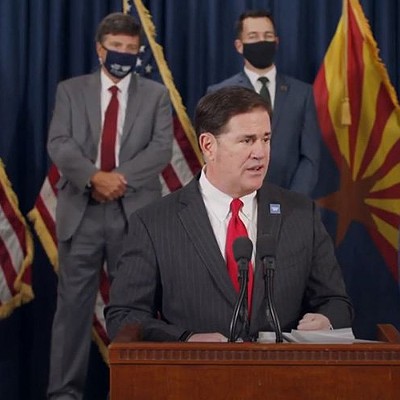What a difference one little $200 million alt-fuel fiasco can make.
It's not just that former Speaker of the House Jeff Groscost (R-Loserville), the corrupt snake-oil salesman who engineered the alt-fuel legislation, was beaten silly in a state Senate run in a safely Republican district, leading to a Senate split 15-15 between Republicans and Democrats.
That Senate tie allowed Republican Randall Gnant to pull off a long-planned coup by cutting a deal with Democrats to get elected Senate President, thereby ousting Brenda Burns (R-Elba), the dragon lady who had ruled the Senate with an iron fist through the previous session. Relations had long been frosty between Burns and Gnant, but now she's the one out in the cold. The exile can't be doing wonders for her once-bright 2002 gubernatorial campaign.
The tremors continue over in the House of Representatives, which is split 36-24 in favor of the GOP. One of Groscost's former lieutenants, Jim Weiers (R-Tightrope), managed to hang onto the speaker's post. Groscost's incineration has shown Weiers the light of conciliation--which means he's more likely to deal than bully.
Under Weiers' shaky command, the GOP caucus is splintering. Earlier this month, several Republicans joined with House Democrats to force an obscure rule change that further eroded the conservative wing's power. The old rules required a minimum of 36 votes to get a bill out of the Rules Committee, which reviewed nearly every bill to reach the floor. Weiers had assigned the chair of the committee to Rep. Karen Johnson (R-Bedrock), a staunch social conservative who spends an extraordinarily large amount of time concerned about the activities of the gay community.
A group of moderate Republicans joined with the Democrats to lower the threshold to 31 votes to free a bill from the Rules Committee. Johnson briefly threatened to resign if the change went through, but remembered her responsibility to her constituents when the vote came down.
In short, as a lobbyist for development interests notes, conservatives have been "completely hosed" this year.
All of which isn't to say that conservative lawmakers have completely given up. Johnson is pushing a bill, for example, that would limit no-fault divorces in Arizona. And Rep. Mark Anderson has come to the defense of the Boy Scouts of America, an organization that has been under fire for its ban on gay members. Anderson's bill would prohibit cities, such as Tucson, from withholding funding for the Boy Scouts because of the gay ban. Tucson City Councilman Fred Ronstadt, a Republican who voted to block funding for the Boy Scouts and other organizations that discriminate, says, "The question I want to ask the good Republican from Mesa is, 'Do you also want to come down here and work on our budget or fix some potholes?' "
But the conservatives' volume has definitely been muted. There's considerably less bitching about the federal government, environmental activists and co-ed dorms.
Instead, there's expansion of social programs. Last week, the state got a waiver from the outgoing Clinton administration that will allow federal matching dollars to implement Healthy Arizona 2, which voters passed as Prop 204 last November. The federal money, combined with the state's tobacco settlement dollars, will cover the cost of extending insurance coverage through the Arizona Health Care Cost Containment System (AHCCCS) to individuals who live under the federal poverty level. Up to an estimated 380,000 Arizonans may be eligible for coverage under the plan.
Other health problems still loom. HMOs are fleeing Arizona's rural counties, leaving seniors with rising prescription drug bills and no coverage. And even though the state has stepped up funding for the treatment of the mentally ill, the state's programs remain woefully inadequate. Gov. Jane Dee Hull promised in her state-of-the-state address to boost spending even higher this year.
Sierra Club lobbyist Sandy Bahr says she sees some improvement, although some of her early hope for the session is fading. "Overall, it doesn't have as hard of an edge," she says. "People are being more pleasant. I'm more optimistic that fewer bad bills will pass."
This week has been particularly discouraging for Bahr, who has worked to block the nomination of rancher Sue Chilton to the state Game and Fish Commission, which develops policy for the Arizona Game and Fish Department. Chilton runs a ranch on the Coronado National Forest that's overseen by Game and Fish staffers who have tangled with her in the past. As a member of the G&F Commission, she'll help set policy for the state agency.
"It's one of those things where they were able to find the most appalling Democratic rancher that they could, so a bunch of Democrats are going to vote for her," Bahr says. "Chilton has a direct conflict."
A development lobbyist, meanwhile, worries that the legislature might pass legislation creating impact fees for schools, a move that has been long blocked at the capitol. "It'll probably go through," the lobbyist says.
That won't be the only educational legislation. Many lawmakers say the state still needs to boost school spending, despite last year's successful ballot measure hiking the sales tax by .6 of a cent. The state is just assuming responsibility for building and repairing schools, which carries a billion-plus price tag.
Higher education is also begging for more dollars. UA President Peter Likins has told the media that the UA alone needs roughly $140 million to bring faculty salaries in line with their academic peers.
How long will the new moderate legislature last? Perhaps not more than two years, when Democratic Sen. Jay Blanchard is up for re-election in District 30, the heavily Republican district he won when Groscost self-immolated.
But changes are in the wind. With the passage of Prop 106, the redistricting power has slipped from the hands of the legislature into an independent redistricting commission that lawmakers are now creating. The new legislative lines could be dramatically different from the current boundaries.
And the effect of term limits has just begun. The first crop of experienced lawmakers was eliminated in November and a second crop will go in 2002. Among those being forced out of office is Senate President Gnant.
Is it any wonder he made a deal with Democrats?

















